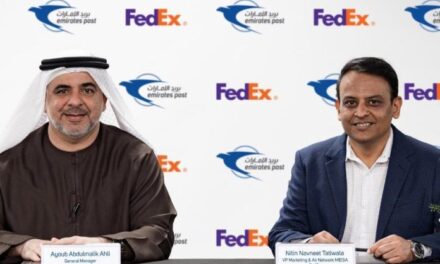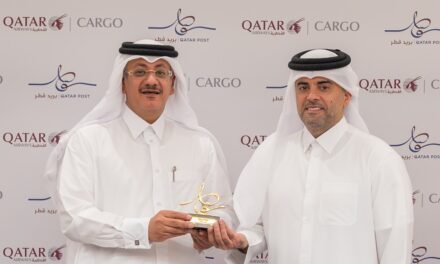
Qatar Post gets better address with RFID technology
In preparation for the Universal Postal Union’s (UPU) Global Monitoring System (GMS), Qatar General Postal Corporation, in partnership with Emirates and Saudi Post recently completed the implementation of a RFID technology project aimed at improving the overall mail services in the region and the globe, reports Computer News Middle East (CNME). The article continues:
CNME’s Manda Banda, chatted to Catina Aghayan, quality & development consultant at Qatar Post, to find out what the implementation of this project means to postal services in the Middle East region.
The postal industry has come a very long way in the past 10 years. Not only has the way people communicate changed enormously, the pressures of competition have forced new priorities on postal services operators, requiring clear strategies to drive necessary transformation forward. Against this back, the postal services landscape globally has been compelled to continue to focus on meeting customer needs, whilst keeping quality of service high and costs low.
It is these changes in the postal services landscape and pressures of competition that has led to many postal organisations to streamline their operations all in a bid to remain relevant and competitive in the provision of postal services.
Consequently, in a move that is part of a broader initiative and part of getting ready for the Universal Postal Union’s (UPU) Global Monitoring System (GMS), the Qatar General Postal Corporation recently finalised the implementation of the RFID project in partnership with the Emirates Post and Saudi Post.
The project according to the Qatar General Postal Corporation kick started three years back and with the help and support of its GCC neighbours the UAE and Saudi the “Triangle Matrix” Arab pilot was born.
Catina Aghayan says from the onset, the three postal organisations that piloted this project were so eager, to take action and offer national, regional and international clients the best quality of service in the postal services arena.
Consequently, says Aghayan to ensure that the project achieved broader appeal and customer satisfaction in the gulf and beyond, the three countries that piloted the initiative with RFID technologies decided to extend and present the pilot to other 22 Arab countries in the region. “At that time, the cost of implementing such a project was an issue,” Aghayan recalls. “The idea to present the project to other 22 Arab countries was intended to get leverage from the power of bulk purchasing the technology which would in turn reduce the cost dramatically.”
Aghayan says the project is one of its kind, both from a technology perspective and how it was implemented within the agreed deadline timeframe. “This is one of the major and quickest pilots we have ever undertaken and delivered successful results,” she notes.
Aghayan points out that when the project kicked off three years ago, the first phase of the initiative saw the three national postal agencies prepare for the eventual launch of the pilot which ran for a period of three months. The Triangle Matrix marked a unique achievement in the region along with the prompt support of all the other companies and sponsors that were involved in this project, she says.
Although the successful piloting of the project was the start, how has the completion of this RFID project improved the mailing system and operations of the three postal organisations in the GCC? What does this project entail to the end-user customer who in essence should benefit from this implementation?
Aghayan says the motivation behind the implementation of this project was not to have a RFID technology into the three postal corporations for the sake of it, but rather to prepare a simple proven technology platform in preparation to the UPU’s GMS.
Today, says Aghayan, thanks to the cooperation of the Triangle Matrix, the three gulf postal organisations have been able to launch the GMS to all member countries in the world and not only in the GCC or Arab region. “We are very proud as the Arab region to have created an impact and contributed positively to the global postal community and serve clients all over the world in an efficient manner,” she says.
As a result of this implementation, says Aghayan postal agencies that have implemented RFID technology as part of their IT infrastructure for monitoring and tracking regular mail, have been able to deliver quality of service and enhance their overall services to the benefit of the end-user.
Aghayan adds that prior to the implementation of this RFID project, Qatar General Postal Corporation like most postal organisations in the world was faced with challenges of not being able to track all mail paths from the time mail is sent right through to its destination. “This may seem very simple yet, highly complicated if there is an IT system failure or glitch at any point of the path that mail has to go through,” she says. “We knew that our international and national delivery complex network comprised gaps, but we were not able to allocate at which particular level the problem was taking place.”
Aghayan points out that by implementing this RFID project, Qatar Post is now able to monitor the exact interval from say point A to B that a regular mail has to pass though and tackle any problem that may arise immediately. “As the official national postal carrier we had to go for proven technologies in the industry,” she says. “The Triangle Matrix presented a combination of RFID technology; semi-active and passive. With a combination of frequencies and equipment which worked in perfect harmony with existing IT infrastructure of the three postal organisations.
Although the actual figure on how much the project cost has not be disclosed, Aghayan says the pilot was funded 100 % by all the 10 organisations that were involved and the ROI is reflected directly, when the UPU GMS Interim Group adopted the Arab pilot in the three countries and its proven results. “We are proud to be able to contribute to the world postal community and support the global UN agency’s efforts to build this global system that will dramatically improve the quality of postal services worldwide,” she says. “In the near future, we will bind our quality of service (QoS) in the postal services arena to international exchange payments.”
Aghayan attributes the success of this project to the fact that it was an all encompassing initiative that involved professionals and experts in the field of RFID. “We had on board vendors of best-of-breed products such as Lyngsoes, Motorola, Quotas and Aida,” she says. “This to a larger extent eliminated any room for failure.”
Aghayan explains that the successful implementation of the first phase of the RFID project has focused on the international regular bulk mail. “We are already monitoring our parcels, registered and EMS mail through bar-coding and the next level we will be integrating GPS, GPRS and of course RFID,” Aghayan concludes.












